#clothing manufacturers united states
Text
Get the best wholesale workout clothes, gym clothes and flannel shirts from the top US Clothing Manufacturer. With bulk orders available and flexible customization options, we are your one-stop destination for wholesale fitness clothing needs. Place your order now!
#USA clothing manufacturers#wholesale children's clothing#clothing manufacters#best private label clothing manufacturers#dress shirt manufacturers in usa#clothing manufacturers united states#usa private label clothing manufacturers#clothing manufacturers in alabama#usa apparel manufacturers#american clothes manufacturers#clothing line manufacturers usa#gym clothes wholesale#gym wear wholesale#wholesale athletic wear#wholesale gym clothing suppliers#wholesale gym apparel
0 notes
Text
The Benefits of Buying Gym Clothes Wholesale
If you’re someone who spends a lot of time working out, then you know the importance of having good quality gym clothes. They need to be comfortable, durable, and able to withstand the rigors of daily use. However, buying high-quality activewear from retail stores can be very expensive. This is where wholesale purchases come in.
Wholesale purchases of gym clothes will allow you to buy workout…

View On WordPress
#activewear manufacturer#activewear manufacturer usa#apparel manufacturers#athletic clothing manufacturer#athletic wear manufacturers#clothing manufacters#clothing manufacturers near me#clothing manufacturers united states#clothing suppliers#custom clothing manufacturers#custom clothing manufacturers in usa#custom workout gear#fitness clothing manufacturer#gym clothing manufacturers#manufacturers in usa#shorts manufacturers#sports clothing manufacturers#sportswear manufacturer#USA clothing manufacturers
0 notes
Text









Cᴜsᴛᴏᴍɪᴢᴇᴅ OEM/ODM Cʟᴏᴛʜs Lᴏᴡ MOQ Hɪɢʜ Pʀᴇᴍɪᴜᴍ Bʀᴀɴᴅ
Mᴀɴᴜғᴀᴄᴛᴜʀᴇʀ🏬 Gᴀʀᴍᴇɴᴛ👗👖 Dɪʀᴇᴄᴛ 📦Fᴀᴄᴛᴏʀʏ ᴛᴏ Yᴏᴜʀ Sᴛᴏʀᴇ, Cᴜsᴛᴏᴍᴇʀ Cᴜsᴛᴏᴍ Oɴʟɪɴᴇ Pʟᴀᴛғᴏʀᴍ ᴀɴᴅ Fᴏʀ Iɴᴅᴇᴘᴇɴᴅᴇɴᴛ Wᴇʙsɪᴛᴇ Bʀᴀɴᴅᴇᴅ Gᴀʀᴍᴇɴᴛs.
Wᴇ'ʀᴇ 📦Mᴀɴᴜғᴀᴄᴛᴜʀᴇʀ Pᴀʀᴛɴᴇʀ ᴏғ ʏᴏᴜʀ Bʀᴀɴᴅᴇᴅ Cʟᴏᴛʜs, Wɪᴛʜ 15 Yᴇᴀʀs Cᴜsᴛᴏᴍ Cʟᴏᴛʜɪɴɢ Exᴘᴇʀɪᴇɴᴄᴇ. Wᴇ Tᴀᴋᴇ ᴄᴀʀᴇ ᴏғ ʏᴏᴜʀ Cʟᴏᴛʜs.
🛡️★🛡️Lᴏᴡ MOQ Aᴄᴄᴇᴘᴛ. ✔
🛡️★🛡️ Sᴀᴍᴘʟᴇ Aᴠᴀɪʟᴀʙɪʟɪᴛʏ. ✔
🛡️★🛡️ Fᴀsᴛ Dᴇʟɪᴠᴇʀʏ. ✔
🛡️★🛡️ Eᴀsʏ Pᴀʏᴍᴇɴᴛ Gᴀᴛᴇᴡᴀʏ. ✔
🛡️★🛡️ Cᴜsᴛᴏᴍɪᴢᴇᴅ Sɪᴢᴇ/Cᴏʟᴏʀ/Lᴀʙᴇʟ/Lᴏɢᴏ/Pᴀᴄᴋᴀɢɪɴɢ. ✔
🙋🏻♂️Wᴇʟᴄᴏᴍᴇ ᴛᴏ Vɪsɪᴛ ᴏᴜʀ 🌐Wᴇʙsɪᴛᴇ & 🖥️Cᴏɴᴛᴀᴄᴛ ᴡɪᴛʜ ᴜs:
🏬💻🖱: https://www.neohopeclothing.com/
🖥️Mᴏʀᴇ Dᴇᴛᴀɪʟ 📝Wʀɪᴛᴇ ᴛᴏ ᴜs ʜᴇʀᴇ:
📧 : sᴇʀᴠɪᴄᴇ@ɴᴇᴏʜᴏᴘᴇᴄʟᴏᴛʜɪɴɢ.ᴄᴏᴍ
📧 : sᴜᴘᴇʀɴᴇᴏʜᴏᴘᴇ@ɢᴍᴀɪʟ.ᴄᴏᴍ
Tʜᴀɴᴋ Yᴏᴜ!! ❀.(´◡`)❀
Wᴇ'ʀᴇ ʜᴇʀᴇ ғᴏʀ ʏᴏᴜʀ ʙʀᴀɴᴅᴇᴅ Cʟᴏᴛʜs. 📦📦📦
#outfit#manufacturing#lowmoq#clothing#cloths#garmentsmanufacturer#usa#made in usa#menswear#tshirtdesign#printedtshirt#golftshirt#customized#customizedcloths#lowmoqmanufacturer#chinamanufacturer#readymade garments#export#usagarments#united states#factory#onlineshopping#clothingbrand#apparel#wholesaler#supplier#exporter#garmentsupplier#style
1 note
·
View note
Text
Presenting quality wholesale clothing at discount prices, Alanic is the go-to manufacturer of Liverpool. Our clothing line is designed for superior comfort and timeless style. Visit us today to see our extensive range of fashionable clothes!

#Wholesale Trendy Clothing Manufacturer in UK#usa clothing manufacturers#wholesale clothing manufacturer#wholesale clothing manufacturers uk#ukWholesale clothing UK#usa made clothing wholesale#wholesale clothing australia#wholesale premium clothing#wholesale custom apparel#united states clothing manufacturers#clothing manufacturer australia#designer clothing vendors#cheap wholesale clothing australia#women's clothing wholesalers australia
1 note
·
View note
Text
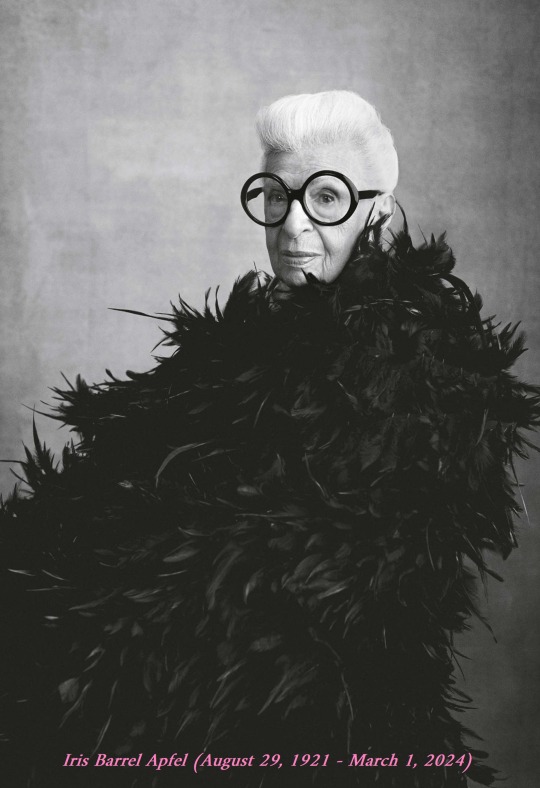



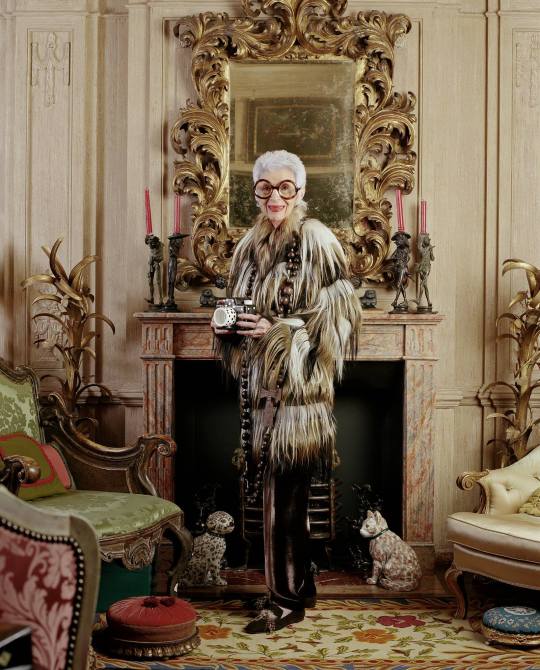


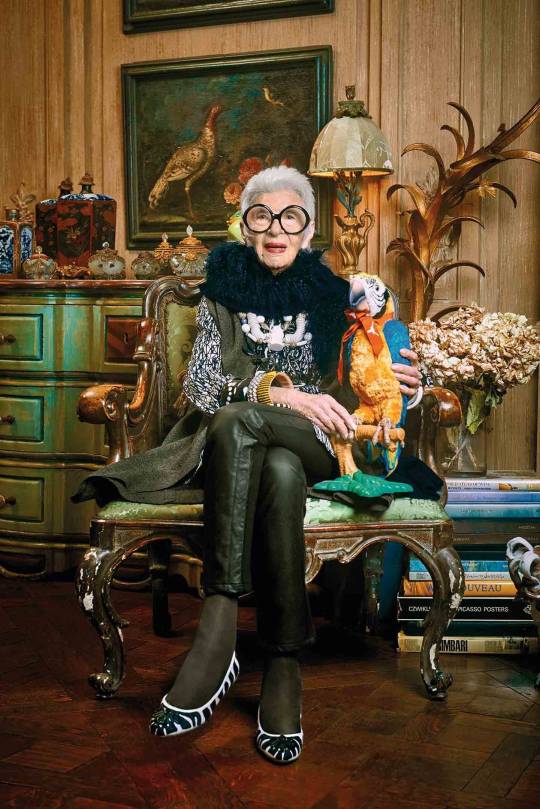
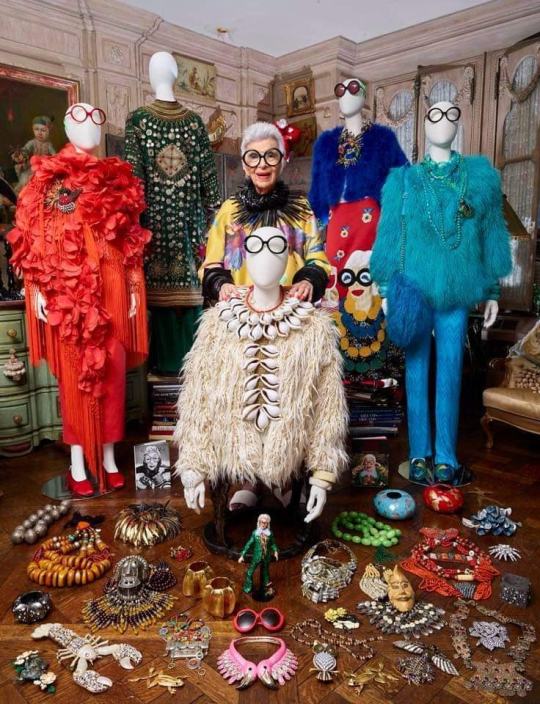
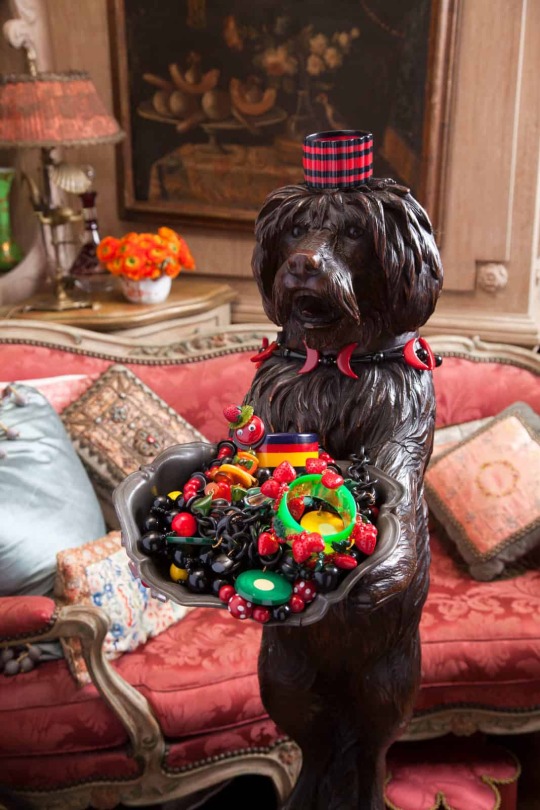
Iris Barrel Apfel, Decorator and Fashion Stylist
(August 29, 1921 – March 1, 2024)
Ms. Apfel was one of the most vivacious personalities in the worlds of fashion, textiles, and interior design, she has cultivated a personal style that is both witty and exuberantly idiosyncratic.
Her originality was typically revealed in her mixing of high and low fashions—Dior haute couture with flea market finds, nineteenth-century ecclesiastical vestments with Dolce & Gabbana lizard trousers.
With remarkable panache and discernment, she combines colors, textures, and patterns without regard to period, provenance, and, ultimately, aesthetic conventions. Paradoxically, her richly layered combinations—even at their most extreme and baroque—project a boldly graphic modernity.
Iris Barrel was born on Aug. 29, 1921, in Astoria, Queens, the only child of Samuel Barrel, who owned a glass and mirror business, and his Russian-born wife, Sadye, who owned a fashion boutique.
She studied art history at New York University, then qualified to teach and did so briefly in Wisconsin before fleeing back to New York to work on Women's Wear Daily, and for interior designer Elinor Johnson, decorating apartments for resale and honing her talent for sourcing rare items before opening her own design firm. She was also an assistant to illustrator Robert Goodman.
As a distinguished collector and authority on antique fabrics, Iris Apfel has consulted on numerous restoration projects that include work at the White House that spanned nine presidencies from Harry Truman to Bill Clinton.
Along with her husband, Carl, she founded Old World Weavers, an international textile manufacturing company and ran it until they retired in 1992. The Apfels specialized in the reproduction of fabrics from the 17th, 18th, and 19th centuries, and traveled to Europe twice a year in search of textiles they could not source in the United States.
The Metropolitan Museum of Art’s Costume Institute assembled 82 ensembles and 300 accessories from her personal collection in 2005 in a show about her called “Rara Avis”.
Almost overnight, Ms. Apfel became an international celebrity of pop fashion.
Ms. Apfel was seen in a television commercial for the French car DS 3, became the face of the Australian fashion brand Blue Illusion, and began a collaboration with the start-up WiseWear. A year later, Mattel created a one-of-a-kind Barbie doll in her image. Last year, she appeared in a beauty campaign for makeup with Ciaté London.
Six years after the Met show she started her fashion line "Rara Avis" with the Home Shopping Network.
She was cover girl of Dazed and Confused, among many other publications, window display artist at Bergdorf Goodman, designer and design consultant, then signed to IMG in 2019 as a model at age 97.
Ms. Iris Apfel became a visiting professor at the University of Texas at Austin in its Division of Textiles and Apparel, teaching about imagination, craft and tangible pleasures in a world of images.
In 2018, she published “Iris Apfel: Accidental Icon,” an autobiographical collection of musings, anecdotes and observations on life and style.
Ms. Apfel’s apartments in New York and Palm Beach were full of furnishings and tchotchkes that might have come from a Luis Buñuel film: porcelain cats, plush toys, statuary, ornate vases, gilt mirrors, fake fruit, stuffed parrots, paintings by Velázquez and Jean-Baptiste Greuze, a mannequin on an ostrich.
The Museum of Lifestyle & Fashion History in Boynton Beach, Florida, is designing a building that will house a dedicated gallery of Ms. Apfel's clothes, accessories, and furnishings.
Ms. Apfel’s work had a universal quality, It’s was a trend.
Rest in Power !
#art#design#fashion#icon#rip#iris apfel#luxury lifestyle#rip riris apfel#style icon#iconic#trend#rare avis#women's fashion#walking closet#muse#themet#style#history#renaissance#baroque#greta garbo#dior#chanel#montana#fendi#jewellery#high fashion#fantasy#women history month
152 notes
·
View notes
Text
WHAT’S GOING ON IN HAITI 🇭🇹
Haiti is a country in the Caribbean and Latin America that has been exploited and oppressed by colonial powers and imperialist forces for centuries. Its people have suffered unimaginable horrors and atrocities. Haiti was the first Black republic in the world, and the second independent nation in the Americas and the first Latin American country It achieved its independence in 1804, after a successful slave revolt against France. Haiti's independence was a threat to the racist and capitalist system that dominated the world. It inspired other enslaved and oppressed people to fight for their freedom and dignity. Haiti was also punished for its independence by the colonial powers. It was forced to pay a huge indemnity to France, and faced trade embargoes, diplomatic isolation, and military interventions.
Haiti was also exploited by multinational corporations and NGOs, who profited from its cheap labor, natural resources, and humanitarian aid. They also imposed their agendas and policies on the Haitian people, undermining their sovereignty and democracy. Haiti was also devastated by natural disasters, such as earthquakes ( a earthquake they are still recovering from that happened in 2010 and then a earthquake that happened in 2021 that killed 1,419 people) hurricanes, and floods, which worsened its already dire situation. Haiti was also victimized by diseases, such as cholera, malaria, and COVID-19, which ravaged its population and health system. The diseases were often introduced or exacerbated by foreign actors, such as the UN peacekeepers who brought cholera to Haiti in 2010. Haiti was also marginalized and silenced by the mainstream media, which portrayed it as a hopeless and helpless case, ignoring its history, culture, and achievements. The media also spread misinformation and stereotypes, fueling racism and stigma.
Haiti was also betrayed and abandoned by its allies and neighbors, who turned a blind eye to its plight, or worse, contributed to its misery. The United States of America, in particular, has a long history of meddling and undermining Haiti's sovereignty and stability. Taking 500,000 dollars from Haitian banks and still collecting money. The United States of America has invaded, occupied, and intervened in Haiti numerous times, imposing its political and economic interests. It has also exploited Haiti's labor and resources, and blocked its development and trade. sugar refining, flour milling, and cement and textile manufacturing, clothing, scrap metal, vegetable oils, dates and cocoa are all things given to other countries by Haiti. The United States of America has also supported and funded the Core Group, a coalition of foreign powers that has interfered in Haiti's internal affairs, manipulating its elections, constitution, and government. The United States of America has also failed to protect the human rights and dignity of the Haitian people, both in Haiti and in the US. It has deported and detained thousands of Haitian refugees and asylum seekers, and discriminated and criminalized them.
Here are a list of countries who agreed to help the United States and Canada evade Haiti:
Germany
France (the same country that we had to pay just to be free)
Benin
Jamaica
Kenya
Yes I am Haitian my dad side is from Haiti. My fathers family moved up here to Seattle because Haitian was going through a small silent genocide and have been since they have been free from France in 1804, France took my countries money and told them that they have to pay reparations just for existing and they had to pay France just to be free from the French. And then America jumps onto the bandwagon and decides to take billions of dollars from Haiti. Haiti was once the richest country but became the most poorest because of ignorance.
My people are being killed everyday just for speaking out against their government, my people are being killed because nobody was their for them when the 2010 and the 2021 earthquake happened because “Haiti is a bad country and helping them won’t do anything” and they are still recovering from that to this very day. Families are being displaced, the violence is getting worse, innocent people are dying and are fighting trying to stay alive, women and children are being r$ped and kidnapped. I have family that live in Haiti that I lost all contact with because they are fighting everyday, and who knows if they are even alive.
Here are some important links to help you get a better understanding on what’s going on in Haiti and stuff to donate to
Donations:
Haitian Health foundation
Partner in Health: Haiti
Hope For Haiti
Haiti Aid
Haiti Children
Haiti Twitter Link for More Donations. P2 P3
Videos
FYI a lot of these videos are from last year but a lot of them speak really well on what is always going on and why they are going through it
Haiti Debt
What is Happening in Haiti
Haiti and the Rice
Listen Part 2
Free These countries as well
What we want to free in Haiti


PLEASE PLEASE PLEASE TAKE THE TIME OUT OF YOUR DAY TO AT LEAST LOOK AT THESE LINKS. For the sake of My dad and the sake of my family I want to see them happy they wanna go home but won’t be able to until Haiti is free I will update this if I need to and please Like, comment, reblog anything is appreciated
230 notes
·
View notes
Text
Frev Friendships — Saint-Just and Robespierre
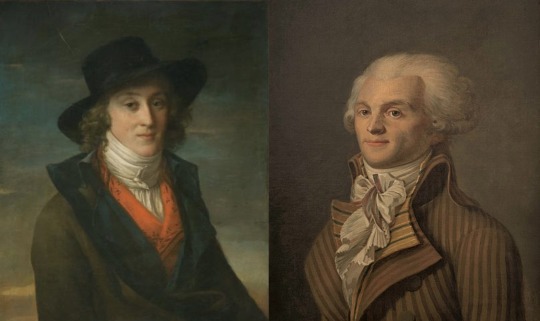
You who supports the tottering fatherland against the torrent of despotism and intrigue, you whom I only know, like God, through his miracles; I speak to you, monsieur, to ask you to unite with me in order to save my sad fatherland. The city of Gouci has relocated (this rumour goes around here) the free markets from the town of Blérancourt. Why do the cities devour the privileges of the countryside? Will there remain no more of them to the latter than size and taxes? Support, please, with all your talent, an address that I make for the same letter, in which I request the reunion of my heritage with the national areas of the canton, so that one lets to my country a privilege without which it has to die of hunger. I do not know you, but you are a great man. You are not only the deputy of a province, you are one of humanity and of the Republic. Please, make it that my request be not despised. I have the honour to be, monsieur, your most humble, most obedient servant.
Saint-Just, constituent of the department of Aisne.
To Monsieur de Robespierre in the National Assembly in Paris.
Blérancourt, near Noyon, August 19, 1790.
Saint-Just’s first letter ever written to Robespierre, dated August 19 1790
Citizens, you are aware that, to dispel the errors with which Roland has covered the entire Republic, the Society has decided that it will have Robespierre's speech printed and distributed. We viewed it as an eternal lesson for the French people, as a sure way of unmasking the Brissotin faction and of opening the eyes of the French to the virtues too long unknown of the minority that sits with the Mountain. I remind you that a subscription office is open at the secretariat. It is enough for me to point it out to you to excite your patriotic zeal, and, by imitating the patriots who each deposited fifty écus to have Robespierre's excellent speech printed, you will have done well for the fatherland.
Saint-Just at the Jacobins, January 1 1793
Patriots with more or less talent […] Jacquier, Saint-Just’s brother-in-law.
Robespierre in a private list, written sometime during his time on the Committee of Public Safety
Saint-Just doesn’t have time to write to you. He gives you his compliments.
Lebas in a letter to Robespierre October 25 1793
Trust no longer has a price when we share it with corrupt men, then we do our duty out of love for our fatherland alone, and this feeling is purer. I embrace you, my friend.
Saint-Just.
To Robespierre the older.
Saint-Just in a post-scriptum note added to a letter written by Lebas to Robespierre, November 5 1793. Saint-Just uses tutoiement with Robespierre here, while Lebas used vouvoiement.
We have made too many laws and too few examples: you punish but the salient crimes, the hypocritical crimes go unpunished. Punish a slight abuse in each part, it is the way to frighten the wicked, and to make them see that the government has its eye on everything. No sooner do we turn our backs than the aristocracy rises in the tone of the day, and commits evils under the colors of liberty.
Engage the committee to give much pomp to the punishment of all faults in government. Before a month has passed you will have illuminated this maze in which counter-revolution and revolution march haphazardly. Call, my friend, the attention of the Jacobin Club to the strong maxims of the public good; let it concern itself with the great means of governing a free state. I invite you to take measures to find out if all the manufactures and factories of France are in activity, and to favor them, because our troops would within a year find themselves without clothes; manufacturers are not patriots, they do not want to work, they must be forced to do so, and not let down any useful establishment. We will do our best here. I embrace you and our mutual friends.
Saint-Just
To Robespierre the older.
Saint-Just in a letter to Robespierre, December 14 1793
Paris, 9 nivôse, year 2 of the Republic.
Friends.
I feared, in the midst of our successes, and on the eve of a decisive victory, the disastrous consequences of a misunderstanding or of a ridiculous intrigue. Your principles and your virtues reassured me. I have supported them as much as I could. The letter that the Committee of Public Safety sent you at the same time as mine will tell you the rest. I embrace you with all my soul.
Robespierre.
Robespierre in a letter to Saint-Just and Lebas, December 29 1793
Why should I not say that this (the dantonist purge) was a meditated assassination, prepared for a long time, when two days after this session where the crime was taking place, the representative Vadier told me that Saint-Just, through his stubbornness, had almost caused the downfall of the members of the two committees, because he had wanted that the accused to be present when he read the report at the National Convention; and such was his obstinacy that, seeing our formal opposition, he threw his hat into the fire in rage, and left us there. Robespierre was also of this opinion; he believed that by having these deputies arrested beforehand, this approach would sooner or later be reprehensible; but, as fear was an irresistible argument with him, I used this weapon to fight him: You can take the chance of being guillotined, if that is what you want; For my part, I want to avoid this danger by having them arrested immediately, because we must not have any illusions about the course we must take; everything is reduced to these bits: If we do not have them guillotined, we will be that ourselves.
À Maximilien Robespierre aux enfers (1794) by Taschereau de Fargues and Paul-Auguste-Jacques. Robespierre and Saint-Just had also worked out the dantonists’ indictment together.
…As far from the insensibility of your Saint-Just as from his base jealousies, [Camille] recoiled in front if the idea of accusing a college comrade, a companion in arms. […] Robespierre, can you really complete the fatal projects which the vile souls that surround you no doubt have inspired you to? […] Had I been Saint-Just’s wife I would tell him this: the sake of Camille is yours, it’s the sake of all the friends of Robespierre!
Lucile Desmoulins in an unsent letter to Robespierre, written somewhere between March 31 and April 4 1794. Lucile seems to have believed it was Saint-Just’s ”bad influence” in particular that got Robespierre to abandon Camille.
In the beginning of floréal (somewhere between April 20 and 30) during an evening session (at the Committee of Public Safety), a brusque fight erupted between Saint-Just and Carnot, on the subject of the administration of portable weapons, of which it wasn’t Carnot, but Prieur de la Côte-d’Or, who was in charge. Saint-Just put big interest in the brother-in-law of Sijas, Luxembourg workshop accounting officer, that one thought had been oppressed and threatened with arbitrary arrest, because he had experienced some difficulties for the purpose of his service with the weapon administration. In this quarrel caused unexpectedly by Saint-Just, one saw clearly his goal, which was to attack the members of the committee who occupied themselves with arms, and to lose their cooperateurs. He also tried to include our collegue Prieur in the inculpation, by accusing him of wanting to lose and imprison this agent. But Prieur denied these malicious claims so well, that Saint-Just didn’t dare to insist on it more. Instead, he turned again towards Carnot, whom he attacked with cruelty; several members of the Committee of General Security assisted. Niou was present for this scandalous scene: dismayed, he retired and feared to accept a pouder mission, a mission that could become, he said, a subject of accusation, since the patriots were busy destroying themselves in this way. We undoubtedly complained about this indecent attack, but was it necessary, at a time when there was not a grain of powder manufactured in Paris, to proclaim a division within the Committee of Public Safety, rather than to make known this fatal secret? In the midst of the most vague indictments and the most atrocious expressions uttered by Saint-Just, Carnot was obliged to repel them by treating him and his friends as aspiring to dictatorship and successively attacking all patriots to remain alone and gain supreme power with his supporters. It was then that Saint-Just showed an excessive fury; he cried out that the Republic was lost if the men in charge of defending it were treated like dictators; that yesterday he saw the project to attack him but that he defended himself. ”It’s you,” he added, ”who is allied with the enemies of the patriots. And understand that I only need a few lines to write for an act of accusation and have you guillotined in two days.”
”I invite you, said Carnot with the firmness that only appartient to virtue: I provoke all your severity against me, I do not fear you, you are ridiculous dictators.” The other members of the Committee insisted in vain several times to extinguish this ferment of disorder in the committee, to remind Saint-Just of the fairer ideas of his colleague and of more decency in the committee; they wanted to call people back to public affairs, but everything was useless: Saint-Just went out as if enraged, flying into a rage and threatening his colleagues. Saint-Just probably had nothing more urgent than to go and warn Robespierre the next day of the scene that had just happened, because we saw them return together the next day to the committee, around one o'clock: barely had they entered when Saint-Just, taking Robespierre by the hand, addressed Carnot saying: ”Well, here you have my friends, here are the ones you attacked yesterday!” Robespierre tried to speak of the respective wrongs with a very hypocritical tone: Saint-Just wanted to speak again and excite his colleagues to take his side. The coldness which reigned in this session, disheartened them, and they left the committee very early and in a good mood.
Réponse des membres des deux anciens Comités de salut public et de sûreté générale (Barère, Collot, Billaud, Vadier), aux imputations renouvellées contre eux, par Laurent Lecointre et declarées calomnieuses par décret du 13 fructidor dernier; à la Convention Nationale (1795), page 103-105
My friends, the committee has taken all the measures within its control at this time to support your zeal. It has asked me to write to you to explain the reasons for some of its provisions. It believed that the main cause of the last failure was the shortage of skilled generals, it will send you all the patriotic and educated soldiers that can be found. It thought it necessary at this time to re-use Stetenhofen, whom it is sending to you, because he has military merit, and because the objections made against him seem at least to be balanced by proofs of loyalty. He also relies on your wisdom and your energy. Salut et amitié.
Paris, 15 floréal, year 2 of the Republic.
Robespierre.
Robespierre to Saint-Just and Lebas, May 4 1793
Dear collegue,
Liberty is exposed to new dangers; the factions arise with a character more alarming than ever. The lines to get butter are more numerous and more turbulent than ever when they have the least pretexts, an insurrection in the prisons which was to break out yesterday and the intrigues which manifested themselves in the time of Hébert are combined with assassination attemps on several occasions against members of the Committee of Public Safety; the remnants of the factions, or rather the factions still alive, are redoubled in audacity and perfidy. There is fear of an aristocratic uprising, fatal to liberty. The greatest peril that threatens it is in Paris. The Committee needs to bring together the lights and energy of all its members. Calculate whether the army of the North, which you have powerfully contributed to putting on the path to victory, can do without your presence for a few days. We will replace you, until you return, with a patriotic representative.
The members composing the Committee of Public Safety.
Robespierre, Prieur, Carnot, Billaud-Varennes, Barère.
Letter to Saint-Just from the CPS, May 25 1794, written by Robespierre. It was penned down just two days after the alleged attempt on Robespierre’s life by Cécile Renault.
Robespierre returned to the Committee a few days later to denounce new conspiracies in the Convention, saying that, within a short time, these conspirators who had lined up and frequently dined together would succeed in destroying public liberty, if their maneuvers were allowed to continue unpunished. The committee refused to take any further measures, citing the necessity of not weakening and attacking the Convention, which was the target of all the enemies of the Republic. Robespierre did not lose sight of his project: he only saw conspiracies and plots: he asked that Saint-Just returned from the Army of the North and that one write to him so that he may come and strengthen the committee. Having arrived, Saint-Just asked Robespierre one day the purpose of his return in the presence of the other members of the Committee; Robespierre told him that he was to make a report on the new factions which threatened to destroy the National Convention; Robespierre was the only speaker during this session. He was met by the deepest silence from the Committee, and he leaves with horrible anger. Soon after, Saint-Just returned to the Army of the North, since called Sambre-et-Mouse. Some time passes; Robespierre calls for Saint-Just to return in vain: finally, he returns, no doubt after his instigations; he returned at the moment when he was most needed by the army and when he was least expected: he returned the day after the battle of Fleurus. From that moment, it was no longer possible to get him to leave, although Gillet, representative of the people to the army, continued to ask for him.
Réponse de Barère, Billaud-Varennes, Collot d’Herbois et Vadier aux imputations de Laurent Lecointre (1795)
On 10 messidor (June 28) I was at the Committee of Public Safety. There, I witnessed those who one accuses today (Billaud-Varenne, Barère, Collot-d'Herbois, Vadier, Vouland, Amar and David) treat Robespierre like a dictator. Robespierre flew into an incredible fury. The other members of the Committee looked on with contempt. Saint-Just went out with him.
Levasseur at the Convention, August 30 1794. If this scene actually took place, it must have done so one day later, 11 messidor (June 29), considering Saint-Just was still away on a mission on the tenth.
Isn’t it around the same time (a few days before thermidor) that Saint-Just and Lebas would dine at your father’s house with Robespierre?
Lebas often dined there, having married one of my sisters. Saint-Just rarely there, but he frequently went to Robespierre’s and climbed the stairs to his office without speaking to anyone.
During the dinner which I’m talking about, did you hear Saint-Just propose to Robespierre to reconcile with some members of the Convention and Committees who appeared to be opposed to him?
No. I only know that they appeared to be very devided.
Do you have any ideas what these divisions were about?
I only learned about it through the discussions which took place on this subject at the Jacobins and through the altercation which was said to have taken place at the Committee of Public Safety between Robespierre older and Carnot.
Robespierre’s host’s son Jacques-Maurice Duplay in an interrogation held January 1 1795
Saint-Just then fell back on his report, and said that he would join the committee the next day (9 thermidor) and that if it did not approve it, he would not read it. Collot continued to unmask Saint-Just; but as he focused more on depicting the dangers praying on the fatherland than on attacking the perfesy of Saint-Just and his accomplices, he gradually reassured himself of his confusion; he listened with composure, returning to his honeyed and hypocritical tone. Some time later, he told Collot d'Herbois that he could be reproached for having made some remarks against Robespierre in a café, and establishing this assertion as a positive fact, he admitted that he had made it the basis of an indictment against Collot, in the speech he had prepared.
Réponse des membres des deux anciens Comités de salut public et de sûrété générale… (1795) page 107.
I attest that Robespierre declared himself a firm supporter of the Convention and never spoke but gently in the Committee so as not to undermine any of its members. […] Billaud-Varenne said to Robespierre, “We are your friends, we have always walked together.” This dishonesty made my heart shudder. The next day, he called him Peisistratos and had written his act of accusation. […] If you reflect carefully on what happened during your last session, you will find the application of everything I said: a man alienated from the Committee due to the bitterest treatments, when this Committee was, in fact, no longer made up of more than the two or three members present, justified himself before you; he did not explain himself clearly enough, to tell the truth, but his alienation and the bitterness in his soul can excuse him somewhat: he does not know why he is being persecuted, he knows nothing except his misfortune. He has been called a tyrant of opinion: here I must explain myself and shine light on a sophism that tends to proscribe merit. And what exclusive right do you have to opinion, you who find that it is a crime to touch souls? Do you find it wrong that a man should be tenderhearted? Are you thus from the court of Philip, you who make war on eloquence? A tyrant of opinion? Who is stopping you from competing for the esteem of the fatherland, you who find it so wrong that someone should captivate it? There is no despot in the world, save Richelieu, who would be insulted by the fame of a writer. Is it a more disinterested triumph? Cato is said to have chased from Rome the bad citizen who had called eloquence at the tribune of harangues, the tyrant of opinion. No one has the right to claim that; it gives itself to reason and its empire is not the in the power of governments. […] The member who spoke for a long time yesterday at this tribune did not seem to have distinguished clearly enough who he was accusing. He had no complaints and has not complained either about the Committees; because the Committees still seem to me to be dignified of your estime, and the misfortunes that I have spoken to you of were born of isolation and the extreme authority of several members left alone.
Saint-Just defending Robespierre in his last, undelivered speech, July 27 1794
One brings St. Just, Dumas and Payan, all of them shackled, they are escorted by policemen. They stay a good quarter of an hour standing in front of the door of the Committee’s room; one makes them sit down onto a windowsill; they have still not uttered a single word, pleasant people make the persons who surround these three men step aside, and say move back, let these gentlemen see their King sleep on a table, just like a man. Saint-Just moves his head in order to see Robespierre. Saint-Just’s figure appeared dejected and humiliated, his swollen eyes expressed chagrin.
Faits recueillis aux derniers instants de Robespierre et de sa saction, du 9 au 10 thermidor (1794) by anonymous.
The Committee of General Security was being spied on by Héron, D…, Lebas: Robespierre knew, through them, word for word, everything that was happening at said committee. This espionage gave rise to more intimate connections between Couthon, Saint-Just and Robespierre. The fierce and ambitious character of the latter gave him the idea of establishing the general police bureau, which, barely conceived, was immediately decreed.
Révélations puisées dans les cartons des comités de Salut public et de Sûreté générale ou mémoires (inédits) (1824) by Gabriel Jérôme Sénart.
Intimately linked with Robespierre, [Saint-Just] had become necessary to him, and he had made himself feared perhaps even more than he had desired to be loved. One never saw them divided in opinion, and if the personal ideas of one had to bow to those of the other, it is certain that Saint-Just never gave in. Robespierre had a bit of that vanity which comes from selfishness; Saint-Just was full of the pride that springs from well-established beliefs; without physical courage, and weak in body, to the point of fearing the whistling of bullets, he had the courage of reflection which makes one wait for certain death, so as not to sacrifice an idea.
Memoirs of René Levasseur (1829) volume 2, page 324-325.
Often [Robespierre] said to me that Camille was perhaps the one among all the key revolutionaries whom he liked best, after our younger brother and Saint-Just.
Mémoires de Charlotte Robespierre sur ses deux frères (1834) page 139.
After the month of March, 1794, Robespierre's conduct appeared to me to change. Saint-Just was to a great degree the cause of this, and this leader was too youthful ; he urged him into the vain and dangerous path of dictatorship which he haughtily proclaimed. From that time all confidences in the two committees were at an end, and the misfortunes that followed the division in the government became inevitable. […] We did not hide from [Robespierre] that Saint-Just, who was formed of more dictatorial stuff, would have ended by overturning him and occupying his place ; we knew too that he would have us guillotined because of our opposition to his plans; so we overthrew him.
Memoirs of Bertrand Barère (1896), volume 1, page 103-104.
About this time Robespierre felt his ambition growing, and he thought that the moment had come to employ his influence and take part in the government. He took steps with certain members of the committee and the Convention, asking them to show a desire that he, Robespierre, should become a member of the Committee of Public Safety. He told the Jacobins it would be useful to observe the work and conduct of the members of the committee, and he told the members of the Convention that there would be more harmony between the Convention and the committee if he entered it. Several deputies spoke to me about it, and the proposal was made to the committee by Couthon and Saint-Just. To ask was to obtain, for a refusal would have been a sort of accusation, and it was necessary to avoid any split during that winter which was inaugurated in such a sinister manner. The committee agreed to his admission, and Robespierre was proposed.
Ibid, volume 2, page 96-97
The continued victories of our fourteen armies were as a cloud of glory over our frontiers, hiding from allied Europe our internecine struggles, and that unhappy side of our national character which acts and reacts so deplorably as much on the whole population as on our nghts and our manners. The enthusiasm with which I announced these victories from the tnbune was so easily seen that Saint- Just and Robespierre, being in the committee at three in the morning, and learning of the taking of Namur and some other Belgian towns, insisted for the future that the letters alone of the generals should be read, without any comments which might exaggerate their contents. I saw at once at whom this reproach was directed, and I took up the gauntlet with the deasion of a man willing to once more merit the hatred of the enemies of our national glory, and the bravery of our armies. Then Samt-Just cried, “ I beg to move that Barère be no longer allowed to add froth to our victories.” […] While Saint-Just was reproving me, Robespierre supported the longsightedness of his friend… […] The next day my report on the taking of Namur was somewhat more carefully drawn up, and I alluded to the observation of my critics, who were envious of the power of public opinion in favour of our troops, then busied in saving the country. This phrase in my report was much commented on, although its meaning was only clear to those who had heard the debate in the committee on the previous evening “Sad are the tunes, sad is the period, when the recital of the triumphs and glories of the armies of the Repubhc is coldly hastened to in this place! Henceforth liberty will be no longer defended by the country, it will be handed over to its enemies!”This pronouncement was not of a nature to be forgiven by Saint-Just and Robespierre, so they determined to supplant me with regard to these reports. They forced that idiot Couthon to attend the Committee of Public Safety at eleven in the morning, before I got there Couthon asked for the letters of the generals that had come in during the night, and took his usual seat at the back of the hall, waiting until the assembly was sufficiently full for him to announce the victones. About one, Couthon, being paralysed and unable to stand up in the tribune, coldly read the news from the armies from his place. This time, no effect was produced in the Assembly, or upon the public. This attempt, authorised by Robespierre and Saint-Just, having missed fire completely, the committee signified its dissatisfaction at the innovation.
Ibid, volume 2, page 123-125
After his return from Fleurus, Saint-Just remained some time in Paris, although his mission as representative to the armies of the Sambre and Meuse and the Rhine and Moselle was unfinished. The campaign was only beginning, but he had several projects in hand, and he stayed in committee, or rather his office, where he was always absorbed and thoughtful. Robespierre, in speaking of him at the committee, said familiarly, as if speaking of an intimate friend: ”Saint-Just is silent and observant, but I have noticed, in his personality, he has a great likeness to Charles IX.” This did not flatter Saint-Just, who was a deeper and cleverer revolutionist than Robespierre. One day, when the former was angry about several legislative propositions or decrees that did not please him, Saint-Just said to him, “Be calm, it is the phlegmatic who govern.”
Ibid, volume 2, page 139
This tyrannical law was the work of Saint-Just Consult the Momteuv of the 22nd of Germinal, where it is reported with the explanation of his motives, and you will see that, if there had been no committee, SamtJust would have used his power with as much dictatorial fanaticism as did Manus, that great enemy of the Roman anstocracy. Robespierre’s fnend never forgave me for having dimmished the force of this blow. Whilst I was at the tnbune of the Convention, he came, with someone unknown, and perused my register of requisitions. He took down certain names, and some days after, towards midnight, Robespierre and Saint-Just entered the committee, where they did not usually come (for they worked in a private office, under pretext that their duties were completely private) A few moments after their entry Saint-Just complained of the abuse I had made of the requisitions, which had been granted, said he, in such profusion that the law of the 21st of Germinal had become null and void.
Ibid, volume 2, page 146
Robespierre, Saint-Just and Couthon were inseparable. The first two had a dark and duplicitous character; they pushed away with a kind of disdainful pride any familiarity or affectionate relationship with their colleagues. The third, a legless man with a pale appearance, affected good-nature, but was no less perfidious than the other two. All three of them had a cold heart, without pity, they interacted only with each other, holding mysterious meetings outside, having a large number of protégés and agents, impenetrable in their designs.
Révélations sur le Comité de salut public by Prieur-Duvernois
Robespierre, who had great confidence in Le Bas because he knew his wise and prudent character well, had chosen him to accompany Saint-Just, whose burning love of the fatherland sometimes led to too much severity, and who had a tendency to get carried away. […] [Saint-Just] also had friendship for me and came often enough to our house. […] Finally our providence, our good friend Robespierre, spoke to Saint-Just to engage him to let me depart with them, along with my sister-in-law Henriette. He consented, but with some conditions.
Memoirs of Élisabeth Lebas (1901)
Volume 8 — page 153. ”Saint-Just, his (Robespierre’s) only confident.” His only confident?
Élisabeth Lebas corrects a passage in Alphonse de Lamartine’s Histoire des Girondins (1847)
The Lamenths and Péthion in the early days, quite rarely Legendre, Merlin de Thionville and Fouché, often Taschereau, Desmoulins and Teault, always Lebas, Saint-Just, David, Couthon and Buonarotti.
Élisabeth Lebas regarding visitors to the Duplay’s during the revolution
—
When arriving in Paris in September 1792, Saint-Just first lived on No. 7 rue de Gaillon up until March 1794, and then on No. 3 rue de Caumartin (today’s No. 5) up until his death. Both those places were within a ten minute walking distance from Robespierre’s home on 398 Rue Saint-Honoré.
Saint-Just was away from Paris (and therefore Robespierre) on missions between March 9 to March 31, October 17 to December 4, December 10 to December 30 (1793), January 22 to February 13, April 30 to May 31 and June 10 to June 29 (1794).
#sj and max holding hands 🤗💓#robespierre#saint-just#maximilien robespierre#louis antoine de saint just#barère#élisabeth lebas#philippe lebas#frev#frev friendships#long post#saintspierre
212 notes
·
View notes
Note
Why do economists need to shut up about mercantilism, as you alluded to in your post about Louis XIV's chief ministers?
In part due to their supposed intellectual descent from Adam Smith and the other classical economists, contemporary economists are pretty uniformly hostile to mercantilism, seeing it as a wrong-headed political economy that held back human progress until it was replaced by that best of all ideas: capitalism.

As a student of economic history and the history of political economy, I find that economists generally have a pretty poor understanding of what mercantilists actually believed and what economic policies they actually supported. In reality, a lot of the things that economists see as key advances in the creation of capitalism - the invention of the joint-stock company, the creation of financial markets, etc. - were all accomplishments of mercantiism.
Rather than the crude stereotype of mercantilists as a bunch of monetary weirdos who thought the secret to prosperity was the hoarding of precious metals, mercantilists were actually lazer-focused on economic development. The whole business about trying to achieve a positive balance of trade and financial liquidity and restraining wages was all a means to an end of economic development. Trade surpluses could be invested in manufacturing and shipping, gold reserves played an important role in deepening capital pools and thus increasing levels of investment at lower interest rates that could support larger-scale and more capital intensive enterprises, and so forth.
Indeed, the arch-sin of mercantilism in the eyes of classical and contemporary economists, their interference in free trade through tariffs, monopolies, and other interventions, was all directed at the overriding economic goal of climbing the value-added ladder.
Thus, England (and later Britain) put a tariff on foreign textiles and an export tax on raw wool and forbade the emigration of skilled workers (while supporting the immigration of skilled workers to England) and other mercantilist policies to move up from being exporters of raw wool (which meant that most of the profits from the higher value-added part of the industry went to Burgundy) to being exporters of cheap wool cloth to being exporters of more advanced textiles. Hell, even Adam Smith saw the logic of the Navigation Acts!

And this is what brings me to the most devastating critique of the standard economist narrative about mercantilism: the majority of the countries that successfully industrialized did so using mercantilist principles rather than laissez-faire principles:
When England became the first industrial economy, it did so under strict protectionist policies and only converted to free trade once it had gained enough of a technological and economic advantage over its competitors that it didn't need protectionism any more.
When the United States industrialized in the 19th century and transformed itself into the largest economy in the world, it did so from behind high tariff walls.
When Germany made itself the leading industrial power on the Continent, it did so by rejecting English free trade economics and having the state invest heavily in coal, steel, and railroads. Free trade was only for within the Zollverein, not with the outside world.
And as Dani Rodrik, Ha-Joon Chang, and others have pointed out, you see the same thing with Japan, South Korea, China...everywhere you look, you see protectionism as the means of achieving economic development, and then free trade only working for already-developed economies.
#political economy#mercantilism#economic development#early modern state-building#early modern period#laissez-faire#classical liberalism#classical economics#economics#economic history
58 notes
·
View notes
Text
“The Great Depression reached into every corner of the country, but it did not affect all people equally. For many middle-class women of all races, the depression required certain changes in spending patterns: buying cheaper cuts of meat, feeding the homeless men who stopped at the back door, and doing without new clothes. Some of these women continued to do community volunteer work, raising money for the unemployed. They saw the food lines, but they did not have to join them.
Among women workers, race played an important role. The fierce competition for jobs fueled racial resentments. Mexican-American and African-American women were the first to lose their jobs and the last to get relief from welfare agencies. Often, they were already living on the margin of survival. Before 1933, when the Prohibition amendment making the manufacture or sale of alcoholic beverages illegal was repealed, many of these women turned to bootlegging, making their own beer or liquor and selling it.
…Even relatively prosperous farm women--owners, not tenants--in general produced as much as 70 percent of what their families consumed in clothing, toys, and food. They not only gardened but raised poultry. During the depression, women increased the size of their gardens and the number of their hens. They made more butter from their dairy cows and sold it. They cut up the sacks that held large amounts of flour and sewed them into underwear. In the previous decade, they had proudly begun to participate in a culture of store-bought goods. Now they began to can food again. Government agents dragged huge canning kettles across the mountains of northern New Mexico and eastern Tennessee so that women in remote farming villages could preserve their food.
Even with all this work, rural children suffered from malnutrition, and rural women faced childbirth without a doctor or midwife because they could afford neither the medical fees nor the gasoline for transportation. The women resented their declining standards of living, particularly those from better-off farm families who owned their own farms and had, during the 1920s, aspired to participate in the new domestic technology of indoor bath-rooms, modern stoves and heating, and super cleanliness.
…In 1936, a federal appeals court overruled an earlier law that had classified birth control information as obscene and thus illegal to dispense. That decision still left state laws intact, however. The number of birth control clinics nationwide rose from 55 in 1930 to 300 by 1938, but in some states and in many rural areas women still had no access to birth control. In 1937, North Carolina became the first state to provide contraceptives with tax dollar, and six others soon followed. Ironically, North Carolina’s reasoning was not that birth control was a human right but that birth control would reduce the black population.
Despite statistics showing that black women had fewer babies than white women with similar incomes and living situations, many white southern officials in states with large black populations feared a black population explosion. In 1939, the Birth Control Federation of American responded to eager southern state governments by developing “The Negro Project,” a program to disseminate birth control information, which they carefully staffed with local black community leaders. Whatever the logic, one quarter of all women in the United States in their 20s during the depression never bore children. This was the highest rate of childlessness for any decade. Many people simply decided not to get married, and marriage rates fell.
…In the mass media women seemed to be receiving mixed messages. On the one hand, in 1930, the Ladies’ Home Journal featured a former career woman confessing, “I know now without any hesitation… that [my husband’s job] must come first.” In 1931, the popular magazine Outlook and Independent quoted the dean of Barnard College, a women’s college in New York City, telling her students that “perhaps the greatest service that you can render to the community… is to have the courage to refuse to work for gain.” And on its front page in 1935, the New York Times reported that women “suffering from masculine psychological states” and an “aversion to marriage” were being “cured” by the removal of their adrenal gland. In this atmosphere, not only were women workers under fire, but women who centered their lives on women rather than on men came under attack. Lesbianism was no longer chic. Lesbian bars almost disappeared. Homosexuality was now seen by many people as just one more threat to the family.
On the other hand, movie houses showed zany screwball comedies with more complicated lessons. Often deliciously ditsy, incompetent women were rescued by sensible, capable men. Yet, the men in these movies were frequently portrayed as bumbling or slower-witted than the women. Sometimes the men were people who needed joy and whimsy restored to their lives, not an unexpected theme for a nation in the throes of an economic depression. In other movies, however, women were by no means incompetent. The women portrayed by Katharine Hepburn, Bette Davis, and Joan Crawford in the 1930s were often intelligent but needed men alternately to tame and to soften them.”
- Sarah Jane Deutsch, “Making Do with Disaster.” in From Ballots to Breadlines: American Women, 1920-1940
#sarah jane deutsch#1930s#race#gender#from ballots to breadlines#class#20th century#history#american
19 notes
·
View notes
Text
Why Buying Wholesale Gym Clothes, Beachwear, and Girls Dresses is a Wise Investment
Get wholesale clothes from the premier American-based wholesale clothing manufacturer. Offering a wide range of quality flannel, denim jackets, sportswear and children’s clothes in bulk, USA Clothing Manufacturer is your go-to source for all your bulk clothing needs!

#Wholesale beachwear suppliers#wholesale girls’ dresses#wholesale gym clothes#gym wear wholesale#kids wholesale vendors#men's wholesale clothing distributors usa#USA clothing manufacturers#best private label clothing manufacturers#usa apparel manufacturers#clothing manufacters#clothing manufacturers in alabama#usa private label clothing manufacturers#dress shirt manufacturers in usa#clothing manufacturers united states#american clothes manufacturers#clothing line manufacturers usa#garment manufacturers in usa#fitness apparel manufacturers usa#dress manufacturers in usa#denim jacket manufacturers usa
0 notes
Text
The Benefits of Buying Wholesale Workout Clothes from USA Clothing Vendors

Whether you are a fitness enthusiast or an athletic apparel retailer, buying wholesale gym clothes can be cost-efficient and profitable. Wholesale workout clothes not only save you money but also allow you to create a unique brand image. However, finding the right wholesale gym clothes supplier can be challenging, especially if you are looking for quality and variety. In this blog
https://usa-clothing.livejournal.com/365.html
post, we will discuss the benefits of buying wholesale workout clothes from USA clothing manufacturers, which can guarantee quality, flexibility, and affordability.
Quality:
American Clothing manufacturers are known for their high-quality standards and strict regulations. When you buy wholesale gym clothes from an American supplier, you can trust that the products are made with premium materials, durable stitching, and accurate sizing. Quality gym clothes not only enhance your performance but also promote your brand reputation. Customers are more likely to return and refer to your brand if they are satisfied with the quality of your products.
Variety:
USA clothing manufacturers offer a wide range of wholesale gym clothes for different sports, activities, and seasons. You can find gym clothes for yoga, running, weightlifting, cross-training, and more. Moreover, American wholesalers provide various styles, colors, and sizes to match your specific needs and preferences. When you have a diverse inventory of wholesale gym clothes, you can attract a broader audience and increase your sales potential.
youtube
Flexibility:
They offer flexible options for buying wholesale gym clothes. You can choose to purchase in bulk, which can lower the unit price and save you money in the long run. Alternatively, you can order small quantities or even custom orders, which can help you test the market and customize your brand image. Furthermore, American wholesalers provide fast and reliable shipping, which can streamline your inventory management and reduce downtime.
Sustainability:
USA clothing makers prioritize sustainability and ethical practices in their production processes. They use eco-friendly materials, minimize waste, and ensure fair labor practices. When you buy wholesale gym clothes from an American supplier, you support a responsible and conscious industry that values the environment and human rights. Additionally, customers are increasingly concerned about sustainability, and they are more likely to support brands that share their values.
Cost-effective:
They offer affordable prices for wholesale gym clothes, without compromising the quality or variety. When you buy wholesale gym clothes from an American supplier, you can save up to 60% compared to retail prices. This means you can allocate more funds for marketing, branding, and expanding your business. Furthermore, buying from American wholesalers can help you avoid the risks of importing from overseas, such as tariffs, delays, and quality issues.
Also Read: Private Label Clothing Manufacturers in New York: Bringing Your Fashion Dreams to Life
Conclusion:
In conclusion, buying wholesale workout clothes from USA clothing manufacturers is a smart and practical choice for fitness enthusiasts and athletic apparel retailers. It guarantees quality, variety, flexibility, sustainability, and affordability, which are essential factors for a successful and competitive business. When you invest in wholesale gym clothes from an American supplier, you not only save money but also build a trustworthy and unique brand that appeals to a diverse audience. So, if you want to take your fitness or retail business to the next level, start searching for a reputable USA clothing manufacturer today.
For Audio: Click Here
For Direction: Click Here
#clothing manufacters#manufacturers in usa#clothing manufacturers near me#usa clothing manufacturers#apparel manufacturers#clothing suppliers#custom clothing manufacturers#sportswear manufacturer#activewear manufacturer#shorts manufacturers#american clothes manufacturers#fitness clothing manufacturer#gym clothing manufacturers#usa clothing suppliers#top clothing manufacturers in usa#best clothing manufacturers in usa#custom workout gear#athletic wear manufacturers#sports clothing manufacturers#clothing manufacturers united states#us based clothing manufacturers#custom clothing manufacturers in usa#activewear manufacturer usa#Youtube
0 notes
Photo

Most people are other people. Their thoughts are someone else's opinions, their lives a mimicry, their passions a quotation.
- Oscar Wilde, De Profundis
It’s true that when people strongly desire something, such as a new item of clothing or a luxury good, they might feel like they ‘need’ it - but they don’t need it in the same way that they need water or food. Their survival isn’t at stake.
Desire (as opposed to need) is an intellectual appetite for things that you perceive to be good, but that you have no physical, instinctual basis for wanting - and that’s true whether those things are actually good or not.
Your intellectual appetites might include knowing the answer to a mathematics problem; the satisfaction of receiving a text from someone you have a crush on; or getting a coveted job offer. These things won’t necessarily cause physical pleasure. They might spill over into physical enjoyment, but they are not dependent on it. Rather, the pleasure is primarily intellectual.
The 13th Century philosopher and theologian Thomas Aquinas wrote that these intellectual appetites are part of what has traditionally been called the ‘will’. When a person wills something, they strive toward it. If they come to possess the object of their desire, their will finds rest in it - and they are able to experience joy, so long as they are able to rest in the object of their desire.
But, for most people, such joy is fleeting. There is always something else to strive for - and this keeps most of us in a constant, sometimes painful, state of never-satisfied striving. And that striving for something that we do not yet possess is called desire. Desire doesn’t bring us joy because it is, by definition, always for something we feel we lack. Understanding the mechanism by which desires take shape, though, can help us avoid living our lives in an endless merry-go-round of desire.
When it comes to understanding the mystery of desire, one contemporary thinker stands above all others: the French social theorist René Girard, a historian-turned-polymath who came to the United States shortly after the Second World War and taught at numerous US universities, including Johns Hopkins and Stanford. By the time he died in 2015, he had been named to the Académie Française and was considered one of the greatest minds of the 20th century.
Girard realised one peculiar feature of desire: ‘We would like our desires to come from our deepest selves, our personal depths,’ he said, ‘but if it did, it would not be desire. Desire is always for something we feel we lack.’ Girard noted that desire is not, as we often imagine it, something that we ourselves fully control. It is not something that we can generate or manufacture on our own. It is largely the product of a social process.
‘Man is the creature who does not know what to desire,’ wrote Girard, ‘and he turns to others in order to make up his mind.’ He called this mimetic, or imitative, desire. Mimesis comes from the Greek word for ‘imitation’, which is the root of the English word ‘mimic’. Mimetic desires are the desires that we mimic from the people and culture around us. If I perceive some career or lifestyle or vacation as good, it’s because someone else has modelled it in such a way that it appears good to me. In other words, we copy other people because it’s low risk and we expect a safer return.
Girard had spent the last 14 years of his career as the Andrew B Hammond Professor of French Language, Literature, and Civilization, at Stanford, where he was the philosophical mentor of Peter Thiel, co-founder of the payments company PayPal and the intelligence company Palantir Technologies - a billionaire who was the first major investor in Facebook. Thiel has credited Girard with helping him see the power of Facebook before most others - and also for helping him escape an unfulfilling career in corporate law and finance. Once he was able to break free from the mimetic herd, he could start thinking more for himself and undertaking projects that were not merely the product of other people’s desires.
I began to realise that understanding mimetic desire was crucial if I wanted to break free from the cycle that I was stuck in. If, like me, you’d like to get a deeper understanding of your own wants and desires, and to take more control over them, then you need to read more from René Girard and especially his book ‘Things Hidden Since the Foundation of the World’ (1978).
#wilde#oscar wilde#quote#mimicry#mimetic theory#rené girard#needs#desires#copying#society#sociology#human nature#human condition
61 notes
·
View notes
Text
Alanic is a leading clothing manufacturer providing top quality wholesale tracksuits. Our experienced designers have been offering great styles with unbeatable prices. Visit our website now and check out our collection!
#tracksuit manufacturer#wholesale tracksuits#wholesale tracksuits manufacturer in USA#clothing wholesalers sydney#private label clothing manufacturers australia#united states clothing manufacturers#wholesale custom apparel#apparel vendors#branded clothing wholesale suppliers#usa clothing manufacturers wholesale#wholesale garments#wholesale manufacturers in usa#custom apparel manufacturers#private label clothing manufacturers usa
0 notes
Note
I very much want to hear about the insane thrift haul!

omg OK so for context i love thrifting but i own wayyyy too many clothes so i have been good lately and have NOT been thrifting. however!!! the weekend before last i ruined my fav jeans (not thrifted) and rly needed to replace them because i wore them constantlyyyyy. so i went to my fav thrift store (which i frequent so often i know the staff by name L M A O) and my expectations were honestly low—
because these were like the PERFECT jeans. ankle length, baggy, high waist, ACTUAL denim w no stretch, in a nice light wash. they were expensive when i bought them—but they lasted me FOREVER and i wore the HELL out of them—and i knew i could get another pair but thought i'd tryyyy to find them thrifted just on the off chance.
i like to thrift jeans in the men's section as they are often better quality, actual denim, and vintage, plus they're usually priced more reasonably than women's clothes. and as soon as i stepped up to the rack i found basically. an EXACT REPLICA. of my favourite jeans. EXCEPT!!! THEY ARE ACTUAL VINTAGE!! in perfect condition. the thrift store doesn't have fitting rooms so i had to take a gamble on them but when i got them home and tried them on they were a PERFECT fit too. they're probably from the 80s/early 90s based on the brand and tag and i swear to god they fit like they were MADE for me. and i paid less than the price of a 6-inch subway sandwich for em.
i was riding a real high after finding these, so then i braved the women's section where i found:
a GORGEOUS midi dress. it's not vintage but it's from a nice brand WITH THE ORIGINAL TAGS STILL ON IT?? it has with short sleeves, a tie-belted waist, a pleated skirt, and it's a light cornflower blue with a pretty floral pattern!!
THEN!! i found an absolutely unreallllllll vintage, faux-suede-ish 2-piece co-ord set in a rly rly nice camel-y toffee colour. it has a pair of high waist, wide leg trousers + a button-down overshirt kind of top (it also had shoulder pads and beading all along the collar and pockets of the shirt, but i have since removed those lmaooooo.) it is a little bit yee haw but i'm SOOOOOOOO into it and it fits me PERFECTLY.
then i was getting rly bold so i was like ok lets check the ladies pants section just to see what's up. i found a nice (non-vintage) ecru coloured pair of jeans: high waist, wide leg, good quality denim. they didn't look worn at all. i didn't quite recognize the brand enough to say whether or not they were actually ""good"" but i was like fuck it we ball and got them too. i get them home, look up the brand. these jeans... are basically brand new..... still available on the manufacturer's website........ for $118 United States of American dollars.
i also got a little wicker basket for my board games if that is of interest to u... but that one is not as exciting hehe.
END OF THRIFT HAUL if u made it this far i LOVE U
14 notes
·
View notes
Text
[Translation] L.D.K. Lounge Designers Killer interview (BARFOUT! magazine vol. 122, Oct. 2005)
(Yes, there's really a long-running arts and culture magazine in Japan called Barfout. Click here to view full-page scans of the feature, and feel free to contact me with any questions/comments.)
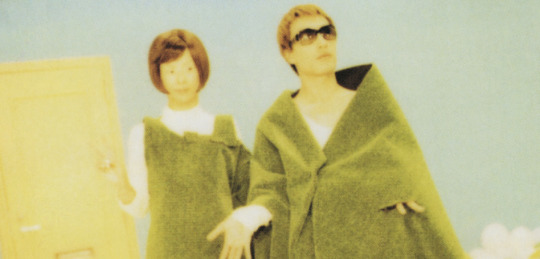
What surprising developments took place on capsule's new album!?
I'm crazy about capsule's newest album, L.D.K. Lounge Designers Killer. It includes "Flying City Plan" [Soratobu Toshikeikaku] — featured in a collaborative music video created by Ghibli subsidiary Studio Kajino and directed by Momose Yoshiyuki — for a total of ten songs (perhaps I should mention that video is on the same level as many sci-fi films!). capsule is a creative unit made up of Nakata Yasutaka (producer) and Koshijima Toshiko (vocalist). The two have been entertaining listeners with their extremely poppy releases that'll take you on a virtual joyride through a world of music inspired by interior design and mass-produced goods. That said, I was taken aback by the song "Glider"! Even with their cool, plastic charm, capsule launched a dramatic pop track with a melody that tugs at the heartstrings the minute it begins. If I had to compare it to works by other artists, it's got a similar feeling to Quruli's "Wandervogel" and Supercar's "YUMEGIWA LAST BOY." Geez, I've really been wearing this song out! (At this point, "Glider" is going at #1 on my top ten favorites of 2005!) Including a club-oriented track with an enjoyable guitar sound, capsule's new album is filled to the brim with groundbreaking songs that overflow with human emotion. It'll definitely add a certain je ne sais quoi to your own space!!!
Original interview text by Fukushima Ryutaro, translation by ystk-archive
"From outerspace to the ocean, I wanted it to have a sense of vastness" (Nakata)
barf: How in the world did you arrive at something like L.D.K. Lounge Designers Killer?
Nakata: All the tracks on this album definitely make me go "hey, I can make good songs too!" (laughs).
barf: The jacket photo is a picture of grass.
Nakata: It's fake. The clothes we wear in the "Glider" video are also made out of that. I'm not much of a nature enthusiast, but in Japan we sure do have a lot of state-manufactured parks, don't we? The album cover's aura is sort of like that, how it's natural but somehow artificial at the same time.
barf: The first track, "Flying City Plan," was used as the basis of a short film, following the examples set by "Portable Airport" [Portable Kuukou] and "space station No.9." They're even screening it before the movie Touch.
Nakata: The first short "Portable Airport" showcases a fantasy town in capsule's type of aesthetic. After that was the resort concept for "space station No.9." So for this third one, we aimed for it to be more visually spacious and panoramic. From outerspace to the ocean, I wanted it to have a sense of vastness, so that's why I went with "Flying City Plan" for the music.
barf: It has a majestic feel.
Nakata: I tried to give it an easygoing sort of speed. When you're flying in an airplane, you can't feel the wind, but you know it's going by extremely fast outside. So the music follows along those lines, with a relaxed pace, kind of giving off an executive's suite type of vibe. And they retired the Concorde planes, so... (laughs)
barf: Did you have any thoughts on the video, Koshijima-san?
Koshijima: It's dramatic. She's a damsel in distress (laughs).
barf: The second track "Teleportation" sounds so much like capsule's usual while simultaneously feeling quite new.
Nakata: That's because, in a rare move, I played the guitar. I've used it before but only for riffs and whatnot, this time I played it more messily.
barf: Speaking of guitars, the third track "Lounge Designers Killer" is rather rock-influenced.
Nakata: To be totally honest, I was given a guitar. So I was just thinking like, "What if I use guitar sounds for this album?" There wasn't a deep reason behind it (laughs).
barf: What kind of guitar did you get?
Nakata: The one I used in the music video.¹ After we finished the shoot for "Glider," I added guitars to the song (laughs). Originally I thought it'd be interesting that the video was going to show a guitar being played with no guitars in the music, but since we went through the trouble of getting it, I threw some in the song after the fact.
barf: That would've been a bizarre visual element (laughs). I get the sense that capsule is strongly influenced by cool instruments.
Nakata: I really like changes of scenery and instruments. With bands, new ideas are sparked by the members interacting with each other, right? I pull my inspirations from instruments and checking out stores I haven't been to before.
"capsule does things without focusing on whether or not it's 'too late' to do them." (Nakata)
barf: "Glider" really comes to life as the seventh track following the science fiction-esque "Antenna."
Nakata: I tried to make the transition sound unnatural. There used to be a sense of flow even though songs weren't actually connected to each other, but nowadays there's a high possibility that people will import albums into a computer and listen to everything out of order anyway. I wanted to put something there that would make the listener go "huh?" when the song changed over. "Antenna" starts and ends abruptly: the intro begins and cuts off halfway through, giving the impression that it's broken; it's the same type of weird feeling you get when the TV channel suddenly changes. So I put that in there to make the connection between the songs worse, not better (laughs).
barf: "Glider" stands out strongly. Koshijima-san, how was it singing this song?
Koshijima: Honestly, my voice was in really bad shape during recording and it was at its worst when we got around to "Glider" — it wouldn't come out at all. But when I got to listen to the song in the studio, I was struck by how long it's been since I heard something so good, and because of that my voice somehow managed to power through (laughs).
barf: The title of "Progress and Harmony for Mankind" [Jinrui no Shinpo to Chouwa] feels a bit out of place, doesn't it (laughs).
Nakata: It's from the 1970 Osaka Expo.
barf: Really!! I didn't make the connection.
Nakata: It's so like us to not use the theme from this year's Expo (laughs).² The Osaka Expo happened during a time when people really valued science. They thought like "with science, anything is possible!" Along with the ecological issues, I think the idea of creating another earth is fascinating (laughs).
barf: With the kind of rhythm it has, the song's got a cool spacy feel to it.
Nakata: That track is close to the type of music that pushed me into doing music. I felt like how I did in junior high, making songs like this when I started recording at home.
Koshijima: You definitely did material like this when we first met. It was pretty heavy (laughs).
Nakata: That's why when I listen to recent releases, I feel like I've gone back in time. These days, a lot of the songs I hear that people say are "good" are nostalgic. Bands have started making house and electro-ish music with '80s sounds and I wind up thinking, "Can they really do that?"
barf: It has gotten like that.
Nakata: capsule does things without focusing on whether or not it's "too late" to do them. It's not that I'm bitter about it though; that's just what happens when you do what you enjoy.
barf: But if that's how you naturally go about about things, then it's okay.
Nakata: It's not a recent phenomenon, but I do think people who create things feel confined. If they do this genre, then they have to use certain sounds — they have so-called rules like that. I make music thinking it'd be nice to ignore those rules.

¹ Nakata owns a Yamaha RGX A2 which he "played" in the Glider music video. I think. I was told that it was actually a different guitar but I guess not!
² 2005 was the Aichi Expo with the theme of "Nature's Wisdom." He's saying this in reference to his disinterest in nature.
#koshijima toshiko#nakata yasutaka#capsule#L.D.K. Lounge Designers Killer#Glider#BARFOUT!#2005#studio ghibli#studio kajino#translations#magazines#interviews
14 notes
·
View notes
Text
LAS VILES; AN OVERVIEW
Sacrilegious takes place in a city called Las Viles, which resides on, and takes up the whole of, a fictional island of New York that became its own independent land over time. It consists of four districts, holds its own form of government, and provides many opportunities of employment for many of the residents to make less than legal money.
HISTORY
The island was bought by a man named Nikolai Ives, a man who had a concerning desire to rule over a population in an authoritarian government. He came from a wealthy background, so with money that he stole from his relatives he built the foundation of a civilization on an island far from mainlands. He spread the word of said civilization and promoted people to come move into the island under his "guidance." Many were intrigued and began to move into Las Viles, including his wife, son, and his son's friend who was staying with them at the time.
As years passed, the city grew in establishments and grew a population of around 20,000 people. Nikolai led as a sort of dictator figure on the island with a board of government officials to do the little tasks for him but all the power remained on him. He established a book of law similar to the United States minus all the characteristics that allow people to overthrow their leader because then people could boot him out of office. He was also a major dick. He made coming onto the island and getting residency simple, but traveling and moving out became nearly impossible.
One day, Nikolai became deathly sick and needed to find someone new to put into power in his place. He had two options as he had two people help him in his rule; his son and his son's friends. His son, Creon, was a people's person who was reckless but had passion. The friend, Baxter, helped make many of the important decisions and deemed himself much more optimal for the position.
Creon got the position of dictator.
Baxter became furious at this decision, but kept quiet. He currently serves as the advisor of Creon as he waits for the right opportunity to finally get the position he deserves.
DISCTRICTS
The island has four districts; the residential, the establishments, the core, and the quarantined. Each district will get their own post so as to go more into detail about the key areas.
The residential district holds the people's homes. The key areas include the apartment complex, the individual housing neighborhood, the public club, the storage units, and a hotel.
The establishments district holds the business, educational, and recreational facilities. The key areas include the corner store/gas station, the library, the mall, the cafe, the clothing manufacturing headquarters, the university, the cathedral, the mortuary, the nightclub, and the obscure employment agency.
The core district holds the major manufacturers and government establishments. The key areas include the law firm, the courthouse, the guard quarters, the prison, the arms factory, the hospital, the pharmacy, the laboratory, the bank, and the tower of authority.
The quarantined district holds Baxter's underground investments and illicit companies hidden from the public and only accessible through obscure means such as tunnels. The key areas include the cleaners office, the hostel, the hitman's centre, the casino, desolate valley which holds the wealthy population only, the warehouses, and valentine's anatomy distribution.
there is also an energy source in the middle that provides power to the island.
#sacrilegious project#oc story#original project#sacrilegious lore#world building#writing#writers on tumblr
12 notes
·
View notes